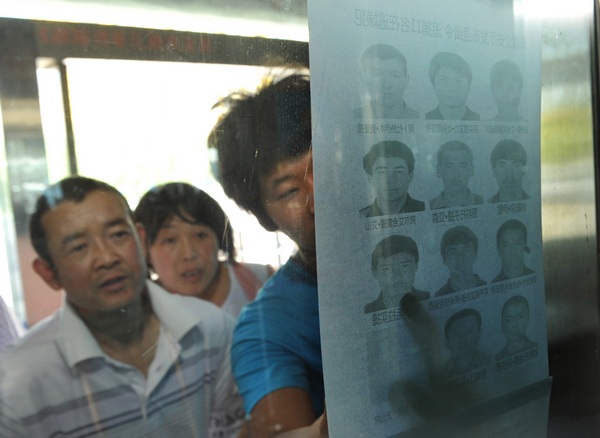Pain lingers after Xinjiang terrorist attack
Updated: 2013-07-05 08:30
By Cui Jia (China Daily)
|
|||||||||||
Increased security
"Since the riots on July 5, 2009, the scale of incidents in Xinjiang has become smaller, but more frequent and easier to carry out, which means the methods to combat these incidents must be updated," said Wang Zhiyong, deputy commissioner of Kashgar prefecture. Fifteen people - 10 Uygur, three Han and two Mongolians - including police officers and community workers, were killed by a gang in Selibuya township, in the prefecture, on April 23 this year.
 |
|
Residents look at a terrorist wanted list at a bus terminal in Urumqi. Zhen Shixin / for China Daily |
Maintaining social stability is the work of grassroots organizations and they will have to be more effective to prevent acts of terrorism, said Yu Zhengsheng, a member of the Standing Committee of the Political Bureau of the Communist Party of China Central Committee and one of China's top political advisors.
In addition to stepping up security in the large cities, villages and communities must be better equipped because they are at the front line of the fight against terror, said Meng Jianzhu, head of the Political and Legislative Affairs Committee of the CPC Central Committee.
Both Yu and Meng made their remarks after arriving in Urumqi at the weekend.
Many recent attacks in the region have occurred in townships and villages and have targeted local authorities.
Earlier this week, the Xinjiang public security bureau urged residents to report any information that could help solve terror cases. The bureau also published a wanted list, which included people suspected of carrying out two attacks in Hotan, including the murders of two school guards and several workers at a construction site.
The last fugitive from the Lukqun attack was captured on Sunday after a tip-off, local police said. Xinjiang police claim that Ahmetniaz Stek, the suspected leader of the gang, organized for members to view videos of extreme religious activity and has instigated several attacks since February. The gang originally has 17 members but one was arrested the day before the attack acting on a tip, according to Xinjiang police.
Police also found that a terrorist cell in Selibuya, allegedly led by a man called Kasmu Memet, was formed in September 2012. Group members regularly attended meetings organized by Kasmu, where they viewed and listened to material relating to religious extremism and terrorism.
They also undertook physical training and learned how to kill by watching footage of terrorist attacks. Police found knives, combat training material, illegal, extreme religious pamphlets, and three jihadist flags after the April 23 attack.
Related Stories
Anti-terror drill staged in Xinjiang 2013-07-03 13:30
Xinjiang offers rewards for tips 2013-07-03 01:30
CPC paper urges to safeguard stability in Xinjiang 2013-07-02 14:51
Xinjiang to reward terrorism whistleblowers 2013-07-02 10:22
Xinjiang violence reaction across Chinese media 2013-07-02 10:17
Search for missing man continues in Xinjiang 2013-07-02 03:07
Today's Top News
EU and US set for free trade negotiations
Top judge underlines justice
China to protect memorial sites for martyrs
KMT vets who fought Japanese are saluted
Hangzhou five seek delayed justice
Workers confine four managers in dispute
'Tiny Times' turns up the heat on summer screens
Russia not to decide Snowden's fate
Hot Topics
Lunar probe , China growth forecasts, Emission rules get tougher, China seen through 'colored lens', International board,
Editor's Picks

|

|

|

|

|

|





